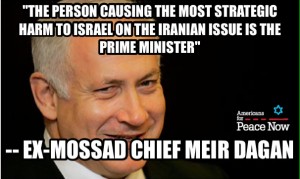Additional sanctions and credible threats of military action can secure a better deal with Iran than current negotiations.
The case Netanyahu laid out against an Iran deal in his address to Congress revolves around 11 core arguments. Think they sound convincing? Look at those arguments one by one, and you’ll see why each of them is bogus.
Prepare for Netanyahu’s Washington Speeches:
Listen for these 11 Bogus Arguments against an Iran Deal
 On March 3rd, Israeli Prime Minister Benjamin Netanyahu will address a joint session of
Congress, where he is expected to make the case against a nuclear deal with Iran, at least a deal that could
result from the current negotiations between Iran and the P5+1 (the U.S., France, Germany, the Russian
Federation, the People's Republic of China, and the United Kingdom). During this visit to Washington,
Netanyahu will make other speeches and find other occasions to speak to the media in which he will no doubt,
make the same case. In anticipation of these speeches and statements, it is important to "un-pack" and
debunk the bogus arguments against an Iran deal that Netanyahu is most likely to be making. The eleven
most prominent of those arguments are examined here. The full document can be printed/downloaded here.
On March 3rd, Israeli Prime Minister Benjamin Netanyahu will address a joint session of
Congress, where he is expected to make the case against a nuclear deal with Iran, at least a deal that could
result from the current negotiations between Iran and the P5+1 (the U.S., France, Germany, the Russian
Federation, the People's Republic of China, and the United Kingdom). During this visit to Washington,
Netanyahu will make other speeches and find other occasions to speak to the media in which he will no doubt,
make the same case. In anticipation of these speeches and statements, it is important to "un-pack" and
debunk the bogus arguments against an Iran deal that Netanyahu is most likely to be making. The eleven
most prominent of those arguments are examined here. The full document can be printed/downloaded here.
On March 3nd, Israeli Prime Minister Benjamin Netanyahu is scheduled to speak to the US Congress at the invitation of the Republican Leadership, not the White House. It’s a decision that’s driven Netanyahu’s already strained relationship with President Obama to a breaking point.
Tim Mathew (February 18, 2015)
Analysis of the historical religious aspects that have helped fuel the conflict, the role that religion currently
plays in the Israeli-Palestinian conflict, and how religion can be utilized going forward to help resolve the
conflict. Read More >
The Torah forbids the cutting down of fruitful trees, even during a time of war. The basis for this law appears in the book of Deuteronomy, with the verse adding rhetorically, “Is the tree of the field a man that you should make war upon it?”
Below are the amendments that are pending for this morning's markup in the Senate Banking Committee of S. 269, “The Nuclear Weapon Free Iran Act of 2015”, along with very brief analysis of what each would do. Taken as a whole, the goal of these amendments appears to be to demonstrate that the base text – which is the subject of serious controversy – could be a lot worse. Which of course is true, but does not change the fact that the base text itself remains problematic, and moving ahead with it at this time directly threatens the ongoing talks with Iran over its nuclear program.
